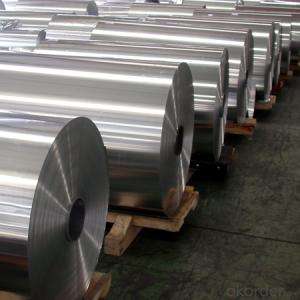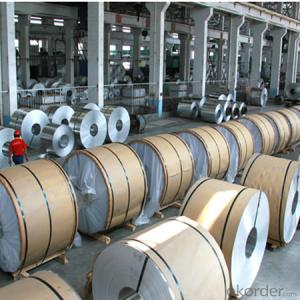1100 H22 Aluminum Rolled Sheet Aluminium Coil
- Loading Port:
- Shanghai
- Payment Terms:
- TT OR LC
- Min Order Qty:
- 5 m.t.
- Supply Capability:
- 500 m.t./month
OKorder Service Pledge
OKorder Financial Service
You Might Also Like
Item specifice
1100 H22 Aluminum Rolled Sheet Aluminium Coil
aluminum coil specifications:
1) Alloy :1050, 1060,1100, 3003 3004 3105 3A21 5005 5052 etc
2) Temper: O/H12/H14/H1/H18/H32/H34/H36/H38//H111/H112/H116/H321/T6/T651/T3/T351 etc
3) Thickness: 0.1mm to 6mm
4) Width:20mm to 3300mm
5)Coil weight: 100kgs to 6 tons depends on actual requirement
6)Core material: Aluminum or paper
7)Coil Inner diameter: 75mm, 150mm, 200mm, 300mm, 405mm, 505mm or as required
8) Protective film can be added
item | 3003 Aluminum coil | |
Standard | GB/T3190-2008,GB/T3880-2006,ASTM B209,JIS H4000-2006,etc | |
Material | 1060,1050,1100 3003,3103,3004,3005,3105 5052, 5454,5754 | |
Size | Thickness | 0.5mm-3.5mm |
Width | 800-1500mm | |
Weight/Roll | About 1.5MT/3MT | |
Quality control | Mill Test Certificate is supplied with shipment, Third Part Inspection is acceptable. | |
Surface | Bright, polished, hair line, brush, checkered, embossed, etc | |
Trade terms | Price term | ,FOB, CNF, CIF, etc |
Payment Term | TT,L/C | |
MOQ | 2MT | |
20 GP Capacity | About 20-25MT | |
Delivery time | 1.The products will delivery immediately after receiving the payment. 2.According to the order quantity, prompt delivery. | |
Export to | Ireland,Singapore,Indonesia,Ukraine,Spain,Canada,USA,Brazil,Thailand,Korea,Iran,India,Egypt,Kuwait, Oman,Viet Nam, South Africa, Dubai, Russia, etc | |
Package | Stick blue film→plastic film→waterproof paper→1~2 tons on a export standard pallet(corner protection) | |
Application | 1)Further making utensil.2)Solar reflective film3)The appearance of the building4)Interior decorating:ceilings,walls,etc.5)Furniture cabinets6)Elevator decoraction7)Signs,nameplate,bags making.8)Decoration inside and outside the car9)Household appliances:refrigerators,microwave ovens,audio equipment,etc.10)The consumer electronics:mobile phones,digital cameras,MP3,etc. | |
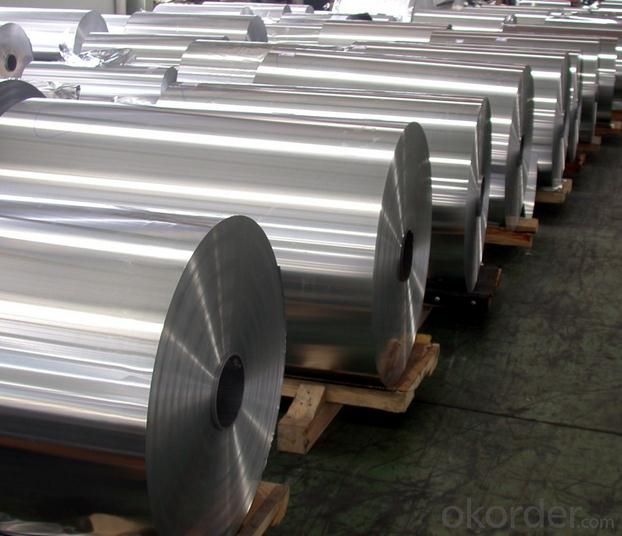
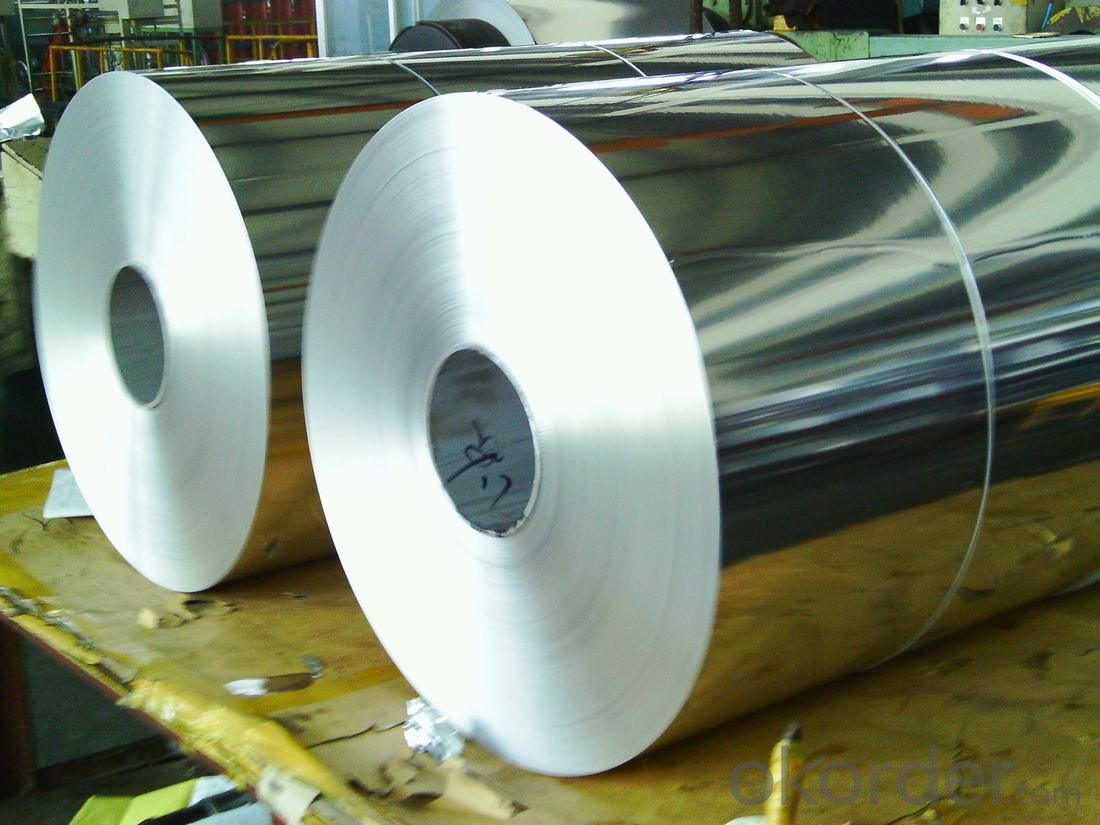
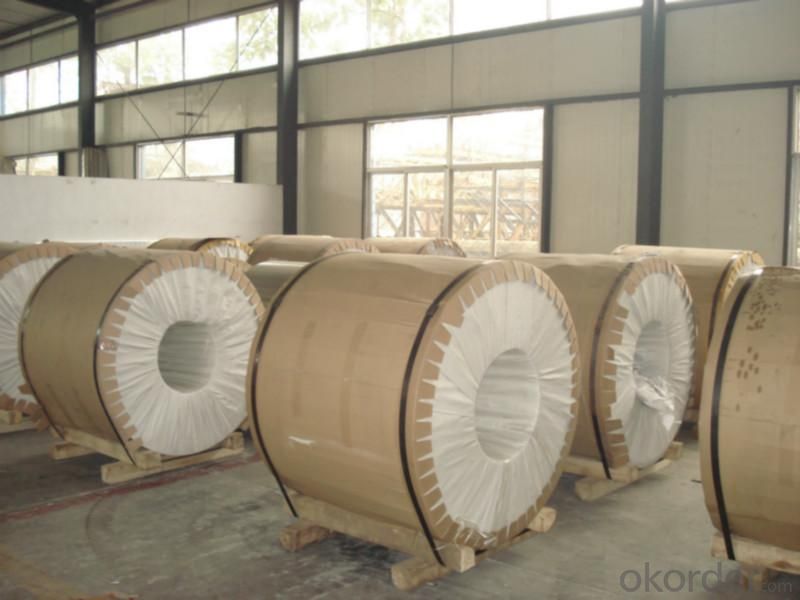
- Q:Aluminum inventory of the company, placed for a little longer, there will be surface oxidation, white spot shape, after cleaning into black spots, affecting the use of. Is there a better and convenient way to save it?
- 1. aluminum storage environment should be dry and bright, well ventilated, no corrosion climate.2. aluminum coil should try to avoid the leaks, snow.3. strengthen the management of rolling oil, its moisture content is controlled below zero point zero four percent.4. aluminum rolls should be packed in a sealed package and should be placed in the right amount of desiccant at the same time.5. do not immediately open the sealed package when it is transported from a low temperature zone into a region of high temperature and humidity.6. the humidity of the wooden shaft and box board of the packing box is not more than 18%, and the temperature of the color aluminum roll is not more than 45 degrees.7. aluminum rolls are prohibited from being stored with chemicals and moist materials during storage.
- Q:Can aluminum coils be used in high-pressure applications?
- No, aluminum coils are not typically used in high-pressure applications due to their lower strength and less resistance to deformation compared to other materials such as steel.
- Q:How are aluminum coils tested for quality control?
- Aluminum coils undergo several tests during quality control to ensure their reliability and performance. One of the primary tests is the dimensional inspection, where the physical dimensions of the coils are measured and compared against the specifications provided by the manufacturer. This helps to identify any discrepancies in length, width, thickness, or diameter. Another crucial test is the visual inspection, where the coils are thoroughly examined for any surface defects such as scratches, dents, or discoloration. This visual examination is essential to ensure that the coils meet the required aesthetic standards. To evaluate the mechanical properties, various mechanical tests are conducted. Tensile strength tests are performed to measure the resistance of the aluminum coils to breaking under tension. This test helps in determining the durability and strength of the coils. Additionally, hardness tests are carried out to assess the coil's resistance to indentation or deformation. The hardness values are compared against the predetermined standards to verify if the coils meet the necessary criteria. Further tests include corrosion resistance testing, where the coils are exposed to harsh environments or corrosive substances to assess their ability to withstand corrosion over time. This test is crucial as aluminum is often used in applications where it may come into contact with corrosive elements. Electrical conductivity tests are conducted to ensure the proper functioning of the coils in electrical applications. The conductivity is measured and compared with the required specifications to guarantee that the coils possess the desired electrical characteristics. In addition to these tests, other factors like chemical composition analysis, surface roughness evaluation, and coating adhesion tests may also be performed depending on the specific requirements of the aluminum coils. Overall, through these comprehensive quality control tests, manufacturers can ensure that aluminum coils meet the necessary standards, guaranteeing their quality, performance, and reliability in various applications.
- Q:What are the potential hazards associated with handling aluminum coils?
- Handling aluminum coils comes with several potential hazards. One major concern is the risk of physical injury. Improper lifting or movement of the heavy coils can lead to strain or sprain injuries. Workers must handle them correctly to avoid such incidents. Furthermore, if the coils are not stacked or stored securely, they may fall and cause harm to workers. Another hazard associated with aluminum coils is the presence of sharp edges. Careless handling can result in cuts or lacerations from the coils' sharp edges or burrs. To minimize the risk of injury, workers should wear appropriate gloves and protective clothing. Another potential danger is the risk of fire or explosion. Aluminum is highly flammable when it comes into contact with certain substances, such as acids or alkalis. Therefore, it is crucial to store aluminum coils in a cool and dry place, away from any flammable materials. Moreover, aluminum coils pose a respiratory hazard. Manipulating or cutting them can release dust or particles into the air, which can cause respiratory irritation or even lung damage. Therefore, workers should wear appropriate respiratory protection when handling aluminum coils. Lastly, aluminum coils can also present a chemical hazard. Some aluminum coils may be coated or treated with chemicals that can be toxic or irritating to the skin and eyes. It is essential for workers to be aware of the specific hazards associated with the type of aluminum coil they are working with and take necessary precautions, such as wearing protective clothing and eye protection. Overall, workers must be aware of the potential hazards linked to aluminum coil handling and take appropriate safety measures to minimize risks. Regular training, proper lifting techniques, the use of protective equipment, and safe storage practices are all vital steps in ensuring the safety of workers who handle aluminum coils.
- Q:How are aluminum coils tested for surface hardness?
- To ensure the quality and suitability of aluminum coils for various applications, a variety of methods are employed to test their surface hardness. One commonly used method is the Rockwell hardness test. During the Rockwell hardness test, a specified amount of force is applied to the surface of the aluminum coil using either a diamond or hardened steel ball. The depth of the resulting indentation made by the ball is then measured, and a hardness value is determined by comparing the difference in depth before and after the force is applied. This value is then compared to a hardness scale in order to assess the surface hardness of the aluminum coil. Another method utilized is the Brinell hardness test. In this test, a specified force is applied to the surface of the aluminum coil using a hardened steel ball. The resulting indentation's diameter is measured, and a hardness value is calculated based on the applied force and indentation size. This value is then compared to a hardness scale to determine the surface hardness of the aluminum coil. Both the Rockwell and Brinell hardness tests are non-destructive and provide accurate measurements of the surface hardness of aluminum coils. These tests enable manufacturers and customers to ensure that the coils meet the necessary hardness criteria for their intended applications, such as in the automotive or construction industries. By conducting surface hardness tests, any potential issues like brittleness or insufficient strength can be identified and addressed prior to the utilization of the aluminum coils in the production process.
- Q:How are aluminum coils protected against scratches and damage?
- Aluminum coils are protected against scratches and damage through various methods such as applying protective coatings, using protective films, and implementing proper handling and packaging techniques during transportation and storage.
- Q:Is aluminum veneer the same as color coated aluminum coil?
- Aluminum veneer is processed aluminum sheet, while color coated aluminum coil is raw material with color which can be called aluminum veneer after process.
- Q:Consider the following ionization energies for aluminum:Al(g) → Al+(g) + eI1 = 580 kJ/molAl+(g) → Al2+(g) + eI2 = 1815 kJ/molAl2+(g) → Al3+(g) + eI3 = 2740 kJ/molAl3+(g) → Al4+(g) + eI4 = 11,600 kJ/mol A) Account for the trend in the values of the ionization energies.B) Explain the large increase between I3 and I4.
- Iron is the main properly-known steel interior the earth. Carbon ought to have the utmost first ionization skill. it rather is considering is going to be the main resultant to resign / take one greater electron. Bromine is so on the brink of being a noble gas it is going to effortlessly income an electron to try this, for that reason it could have a low first ionization skill. the backside electronegative is interior the decrease left nook of the periodic table. It is going to the utmost as much as the better precise of the periodic table. for that reason l. a. could have the backside electronegative.
- Q:Can aluminum coils be used in the production of aluminum composite doors?
- Yes, aluminum coils can be used in the production of aluminum composite doors. Aluminum coils are often used as the primary material for manufacturing aluminum composite doors due to their durability, lightweight nature, and corrosion resistance. These coils are typically processed and shaped into different components of the door, such as panels, frames, and profiles, to create a strong and aesthetically appealing final product.
- Q:Are aluminum coils suitable for manufacturing cookware?
- Aluminum coils, indeed, prove to be appropriate for the production of cookware. The reason behind aluminum's popularity in cookware lies in its exceptional heat conductivity, which results in uniform heating and efficient cooking. Moreover, its lightweight and sturdy nature make it convenient to handle and long-lasting. Additionally, aluminum possesses resistance against rust and corrosion, making it the perfect choice for cookware frequently exposed to water and heat. Nevertheless, it is crucial to acknowledge that uncoated aluminum cookware might react with certain acidic or alkaline foods, leading to a metallic taste. To tackle this issue, numerous aluminum cookware manufacturers utilize non-stick coatings or anodized finishes to prevent food reactions and enhance the cookware's durability. All in all, aluminum coils serve as a suitable material for the manufacture of cookware, but it is imperative to consider the specific requirements and coatings necessary for various types of cookware to ensure safety and optimal performance.
1. Manufacturer Overview |
|
|---|---|
| Location | |
| Year Established | |
| Annual Output Value | |
| Main Markets | |
| Company Certifications | |
2. Manufacturer Certificates |
|
|---|---|
| a) Certification Name | |
| Range | |
| Reference | |
| Validity Period | |
3. Manufacturer Capability |
|
|---|---|
| a)Trade Capacity | |
| Nearest Port | |
| Export Percentage | |
| No.of Employees in Trade Department | |
| Language Spoken: | |
| b)Factory Information | |
| Factory Size: | |
| No. of Production Lines | |
| Contract Manufacturing | |
| Product Price Range | |
Send your message to us
1100 H22 Aluminum Rolled Sheet Aluminium Coil
- Loading Port:
- Shanghai
- Payment Terms:
- TT OR LC
- Min Order Qty:
- 5 m.t.
- Supply Capability:
- 500 m.t./month
OKorder Service Pledge
OKorder Financial Service
Similar products
New products
Hot products
Hot Searches
Related keywords
